Exploring Organisational Behaviour: A Case Study of Tesco
VerifiedAdded on 2023/06/05
|14
|4475
|294
Report
AI Summary
This report provides an in-depth analysis of organizational behaviour within Tesco, a British retail giant. It explores how Tesco's organizational culture, politics, and power structures influence individual and team behavior and performance. The report evaluates content and process theories of motivation, examining how motivation techniques contribute to effective goal achievement. It distinguishes between effective and ineffective teams, analyzing relevant team and group development theories to foster cooperation. Furthermore, the study applies organizational behavior concepts and philosophies to specific business situations within Tesco, providing insights into how the company can enhance its organizational effectiveness. This student-contributed assignment is available on Desklib, a platform offering study tools for students, including access to past papers and solved assignments.
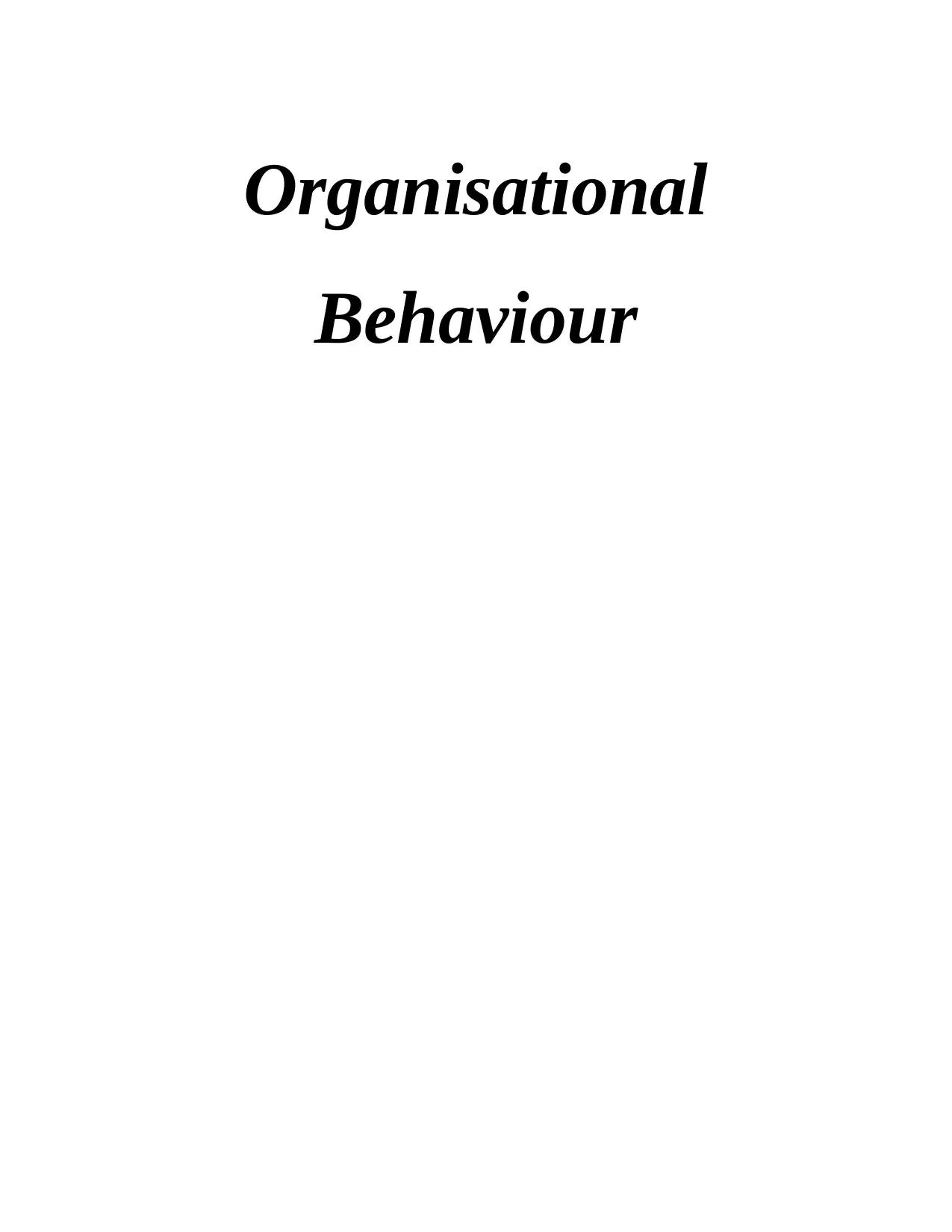
Organisational
Behaviour
Behaviour
Paraphrase This Document
Need a fresh take? Get an instant paraphrase of this document with our AI Paraphraser
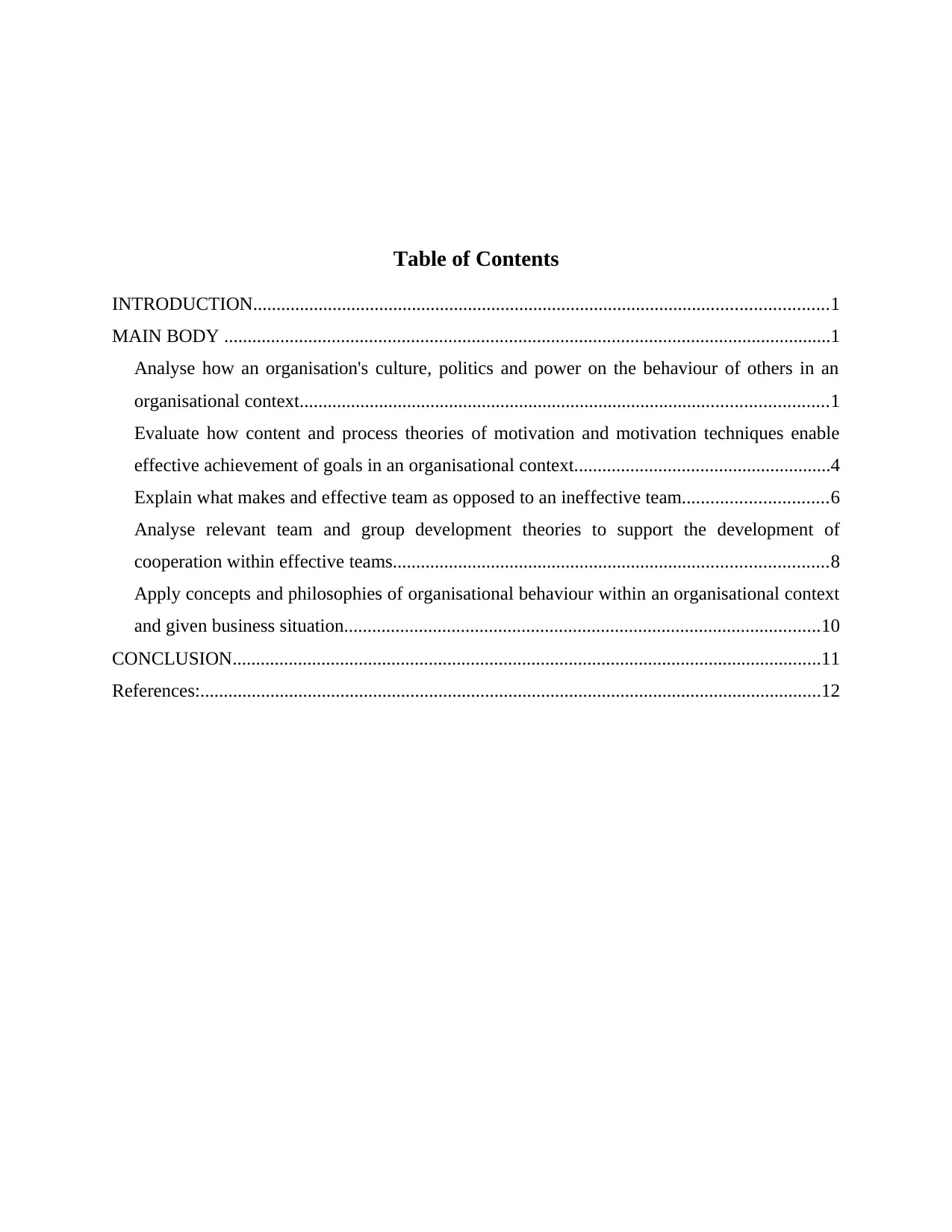
Table of Contents
INTRODUCTION...........................................................................................................................1
MAIN BODY ..................................................................................................................................1
Analyse how an organisation's culture, politics and power on the behaviour of others in an
organisational context.................................................................................................................1
Evaluate how content and process theories of motivation and motivation techniques enable
effective achievement of goals in an organisational context.......................................................4
Explain what makes and effective team as opposed to an ineffective team...............................6
Analyse relevant team and group development theories to support the development of
cooperation within effective teams.............................................................................................8
Apply concepts and philosophies of organisational behaviour within an organisational context
and given business situation......................................................................................................10
CONCLUSION..............................................................................................................................11
References:.....................................................................................................................................12
INTRODUCTION...........................................................................................................................1
MAIN BODY ..................................................................................................................................1
Analyse how an organisation's culture, politics and power on the behaviour of others in an
organisational context.................................................................................................................1
Evaluate how content and process theories of motivation and motivation techniques enable
effective achievement of goals in an organisational context.......................................................4
Explain what makes and effective team as opposed to an ineffective team...............................6
Analyse relevant team and group development theories to support the development of
cooperation within effective teams.............................................................................................8
Apply concepts and philosophies of organisational behaviour within an organisational context
and given business situation......................................................................................................10
CONCLUSION..............................................................................................................................11
References:.....................................................................................................................................12
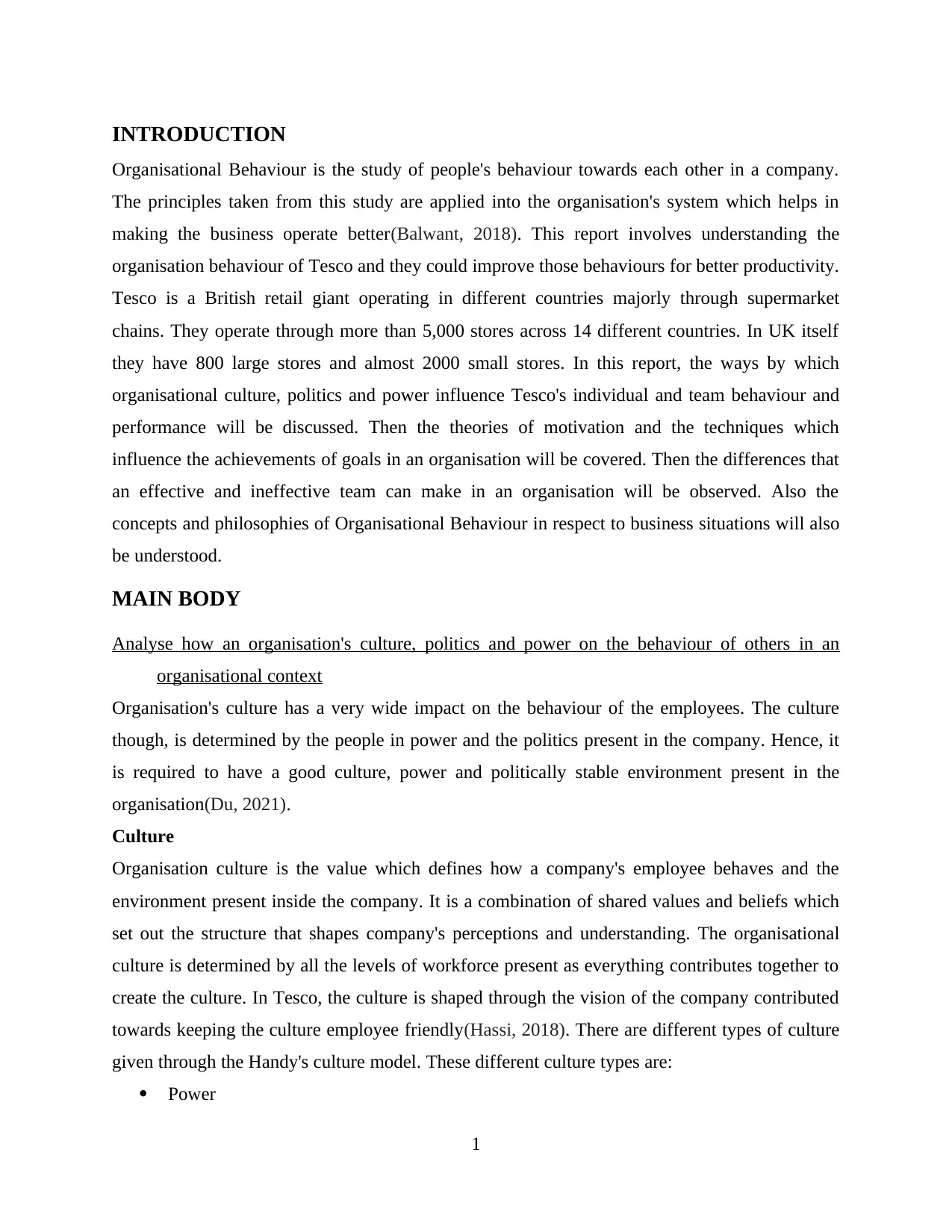
INTRODUCTION
Organisational Behaviour is the study of people's behaviour towards each other in a company.
The principles taken from this study are applied into the organisation's system which helps in
making the business operate better(Balwant, 2018). This report involves understanding the
organisation behaviour of Tesco and they could improve those behaviours for better productivity.
Tesco is a British retail giant operating in different countries majorly through supermarket
chains. They operate through more than 5,000 stores across 14 different countries. In UK itself
they have 800 large stores and almost 2000 small stores. In this report, the ways by which
organisational culture, politics and power influence Tesco's individual and team behaviour and
performance will be discussed. Then the theories of motivation and the techniques which
influence the achievements of goals in an organisation will be covered. Then the differences that
an effective and ineffective team can make in an organisation will be observed. Also the
concepts and philosophies of Organisational Behaviour in respect to business situations will also
be understood.
MAIN BODY
Analyse how an organisation's culture, politics and power on the behaviour of others in an
organisational context
Organisation's culture has a very wide impact on the behaviour of the employees. The culture
though, is determined by the people in power and the politics present in the company. Hence, it
is required to have a good culture, power and politically stable environment present in the
organisation(Du, 2021).
Culture
Organisation culture is the value which defines how a company's employee behaves and the
environment present inside the company. It is a combination of shared values and beliefs which
set out the structure that shapes company's perceptions and understanding. The organisational
culture is determined by all the levels of workforce present as everything contributes together to
create the culture. In Tesco, the culture is shaped through the vision of the company contributed
towards keeping the culture employee friendly(Hassi, 2018). There are different types of culture
given through the Handy's culture model. These different culture types are:
Power
1
Organisational Behaviour is the study of people's behaviour towards each other in a company.
The principles taken from this study are applied into the organisation's system which helps in
making the business operate better(Balwant, 2018). This report involves understanding the
organisation behaviour of Tesco and they could improve those behaviours for better productivity.
Tesco is a British retail giant operating in different countries majorly through supermarket
chains. They operate through more than 5,000 stores across 14 different countries. In UK itself
they have 800 large stores and almost 2000 small stores. In this report, the ways by which
organisational culture, politics and power influence Tesco's individual and team behaviour and
performance will be discussed. Then the theories of motivation and the techniques which
influence the achievements of goals in an organisation will be covered. Then the differences that
an effective and ineffective team can make in an organisation will be observed. Also the
concepts and philosophies of Organisational Behaviour in respect to business situations will also
be understood.
MAIN BODY
Analyse how an organisation's culture, politics and power on the behaviour of others in an
organisational context
Organisation's culture has a very wide impact on the behaviour of the employees. The culture
though, is determined by the people in power and the politics present in the company. Hence, it
is required to have a good culture, power and politically stable environment present in the
organisation(Du, 2021).
Culture
Organisation culture is the value which defines how a company's employee behaves and the
environment present inside the company. It is a combination of shared values and beliefs which
set out the structure that shapes company's perceptions and understanding. The organisational
culture is determined by all the levels of workforce present as everything contributes together to
create the culture. In Tesco, the culture is shaped through the vision of the company contributed
towards keeping the culture employee friendly(Hassi, 2018). There are different types of culture
given through the Handy's culture model. These different culture types are:
Power
1
⊘ This is a preview!⊘
Do you want full access?
Subscribe today to unlock all pages.

Trusted by 1+ million students worldwide
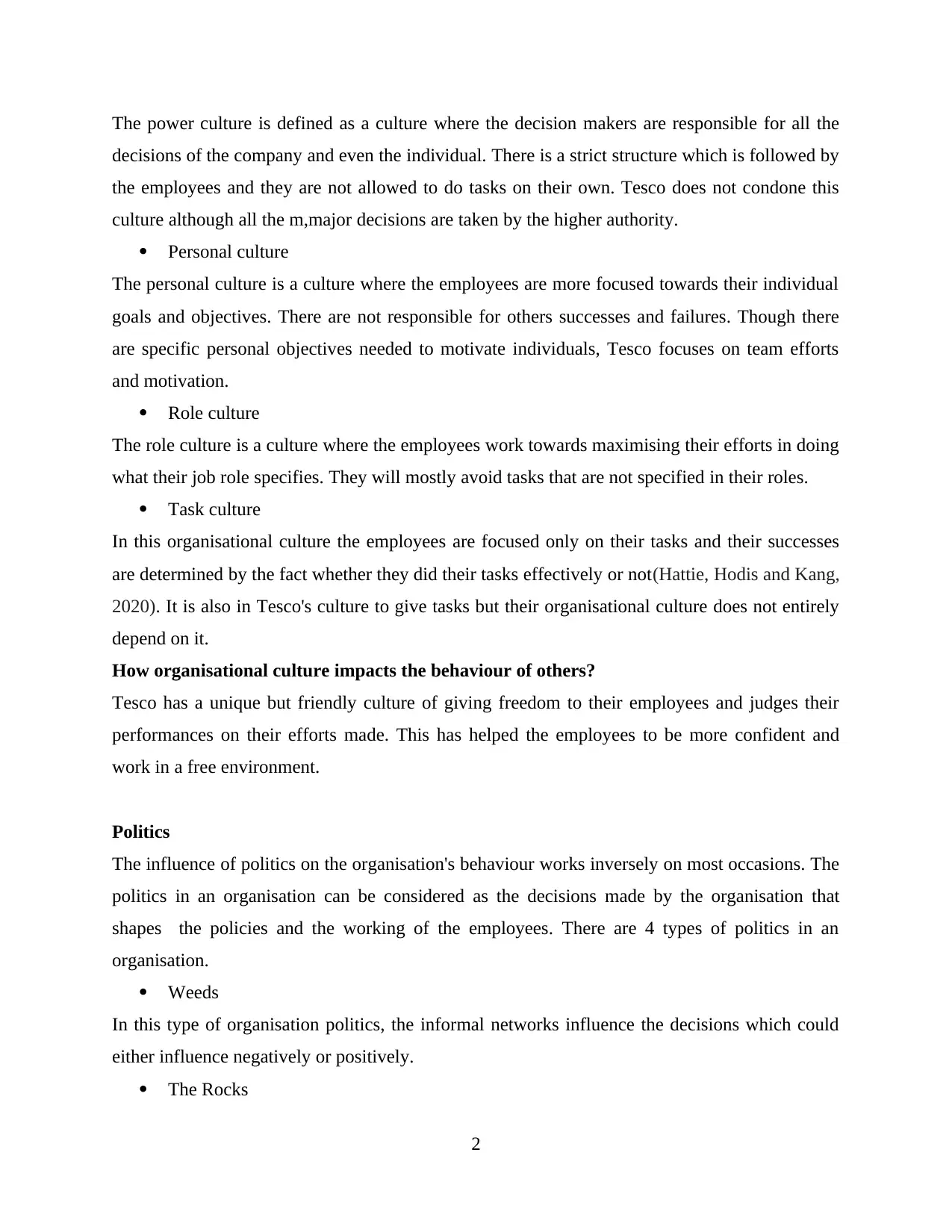
The power culture is defined as a culture where the decision makers are responsible for all the
decisions of the company and even the individual. There is a strict structure which is followed by
the employees and they are not allowed to do tasks on their own. Tesco does not condone this
culture although all the m,major decisions are taken by the higher authority.
Personal culture
The personal culture is a culture where the employees are more focused towards their individual
goals and objectives. There are not responsible for others successes and failures. Though there
are specific personal objectives needed to motivate individuals, Tesco focuses on team efforts
and motivation.
Role culture
The role culture is a culture where the employees work towards maximising their efforts in doing
what their job role specifies. They will mostly avoid tasks that are not specified in their roles.
Task culture
In this organisational culture the employees are focused only on their tasks and their successes
are determined by the fact whether they did their tasks effectively or not(Hattie, Hodis and Kang,
2020). It is also in Tesco's culture to give tasks but their organisational culture does not entirely
depend on it.
How organisational culture impacts the behaviour of others?
Tesco has a unique but friendly culture of giving freedom to their employees and judges their
performances on their efforts made. This has helped the employees to be more confident and
work in a free environment.
Politics
The influence of politics on the organisation's behaviour works inversely on most occasions. The
politics in an organisation can be considered as the decisions made by the organisation that
shapes the policies and the working of the employees. There are 4 types of politics in an
organisation.
Weeds
In this type of organisation politics, the informal networks influence the decisions which could
either influence negatively or positively.
The Rocks
2
decisions of the company and even the individual. There is a strict structure which is followed by
the employees and they are not allowed to do tasks on their own. Tesco does not condone this
culture although all the m,major decisions are taken by the higher authority.
Personal culture
The personal culture is a culture where the employees are more focused towards their individual
goals and objectives. There are not responsible for others successes and failures. Though there
are specific personal objectives needed to motivate individuals, Tesco focuses on team efforts
and motivation.
Role culture
The role culture is a culture where the employees work towards maximising their efforts in doing
what their job role specifies. They will mostly avoid tasks that are not specified in their roles.
Task culture
In this organisational culture the employees are focused only on their tasks and their successes
are determined by the fact whether they did their tasks effectively or not(Hattie, Hodis and Kang,
2020). It is also in Tesco's culture to give tasks but their organisational culture does not entirely
depend on it.
How organisational culture impacts the behaviour of others?
Tesco has a unique but friendly culture of giving freedom to their employees and judges their
performances on their efforts made. This has helped the employees to be more confident and
work in a free environment.
Politics
The influence of politics on the organisation's behaviour works inversely on most occasions. The
politics in an organisation can be considered as the decisions made by the organisation that
shapes the policies and the working of the employees. There are 4 types of politics in an
organisation.
Weeds
In this type of organisation politics, the informal networks influence the decisions which could
either influence negatively or positively.
The Rocks
2
Paraphrase This Document
Need a fresh take? Get an instant paraphrase of this document with our AI Paraphraser
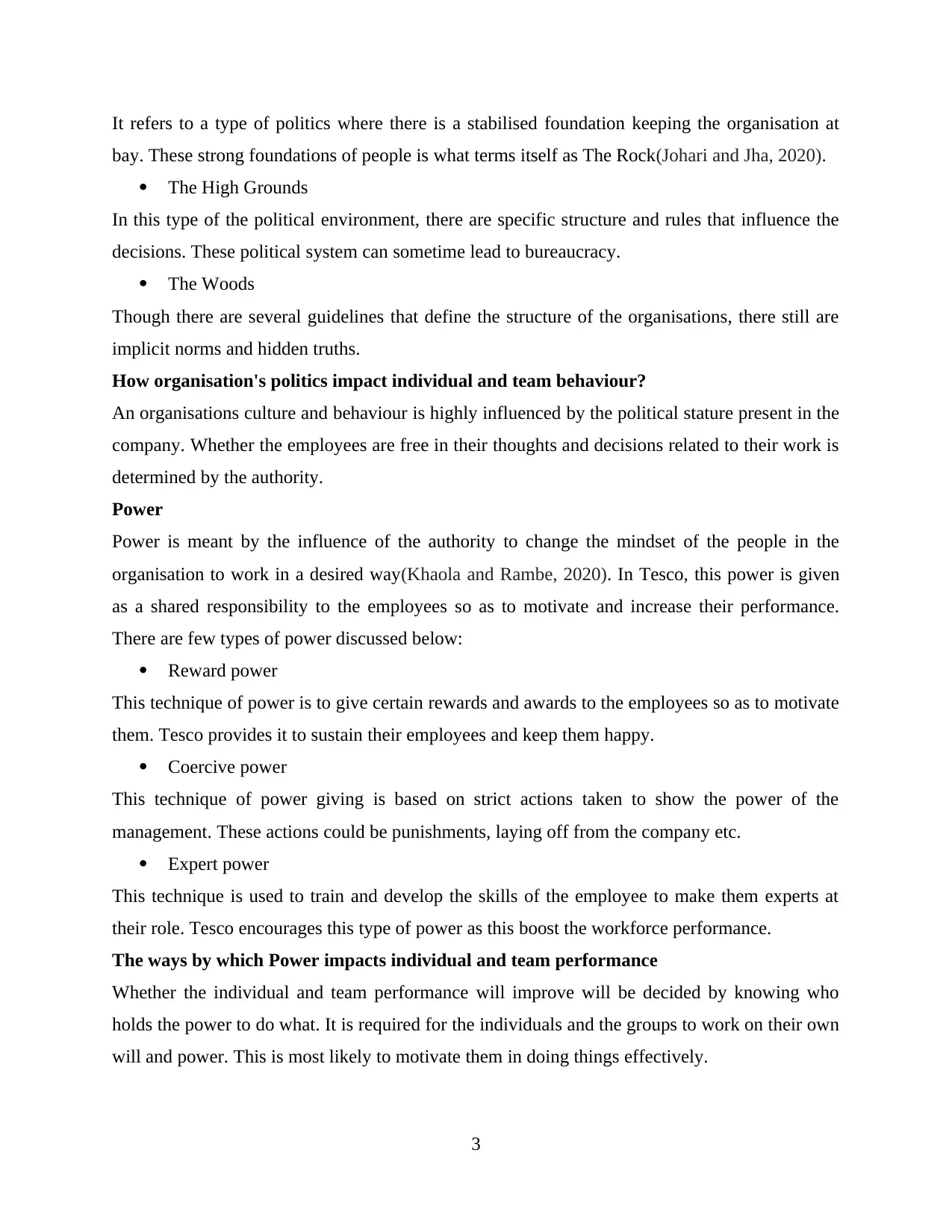
It refers to a type of politics where there is a stabilised foundation keeping the organisation at
bay. These strong foundations of people is what terms itself as The Rock(Johari and Jha, 2020).
The High Grounds
In this type of the political environment, there are specific structure and rules that influence the
decisions. These political system can sometime lead to bureaucracy.
The Woods
Though there are several guidelines that define the structure of the organisations, there still are
implicit norms and hidden truths.
How organisation's politics impact individual and team behaviour?
An organisations culture and behaviour is highly influenced by the political stature present in the
company. Whether the employees are free in their thoughts and decisions related to their work is
determined by the authority.
Power
Power is meant by the influence of the authority to change the mindset of the people in the
organisation to work in a desired way(Khaola and Rambe, 2020). In Tesco, this power is given
as a shared responsibility to the employees so as to motivate and increase their performance.
There are few types of power discussed below:
Reward power
This technique of power is to give certain rewards and awards to the employees so as to motivate
them. Tesco provides it to sustain their employees and keep them happy.
Coercive power
This technique of power giving is based on strict actions taken to show the power of the
management. These actions could be punishments, laying off from the company etc.
Expert power
This technique is used to train and develop the skills of the employee to make them experts at
their role. Tesco encourages this type of power as this boost the workforce performance.
The ways by which Power impacts individual and team performance
Whether the individual and team performance will improve will be decided by knowing who
holds the power to do what. It is required for the individuals and the groups to work on their own
will and power. This is most likely to motivate them in doing things effectively.
3
bay. These strong foundations of people is what terms itself as The Rock(Johari and Jha, 2020).
The High Grounds
In this type of the political environment, there are specific structure and rules that influence the
decisions. These political system can sometime lead to bureaucracy.
The Woods
Though there are several guidelines that define the structure of the organisations, there still are
implicit norms and hidden truths.
How organisation's politics impact individual and team behaviour?
An organisations culture and behaviour is highly influenced by the political stature present in the
company. Whether the employees are free in their thoughts and decisions related to their work is
determined by the authority.
Power
Power is meant by the influence of the authority to change the mindset of the people in the
organisation to work in a desired way(Khaola and Rambe, 2020). In Tesco, this power is given
as a shared responsibility to the employees so as to motivate and increase their performance.
There are few types of power discussed below:
Reward power
This technique of power is to give certain rewards and awards to the employees so as to motivate
them. Tesco provides it to sustain their employees and keep them happy.
Coercive power
This technique of power giving is based on strict actions taken to show the power of the
management. These actions could be punishments, laying off from the company etc.
Expert power
This technique is used to train and develop the skills of the employee to make them experts at
their role. Tesco encourages this type of power as this boost the workforce performance.
The ways by which Power impacts individual and team performance
Whether the individual and team performance will improve will be decided by knowing who
holds the power to do what. It is required for the individuals and the groups to work on their own
will and power. This is most likely to motivate them in doing things effectively.
3
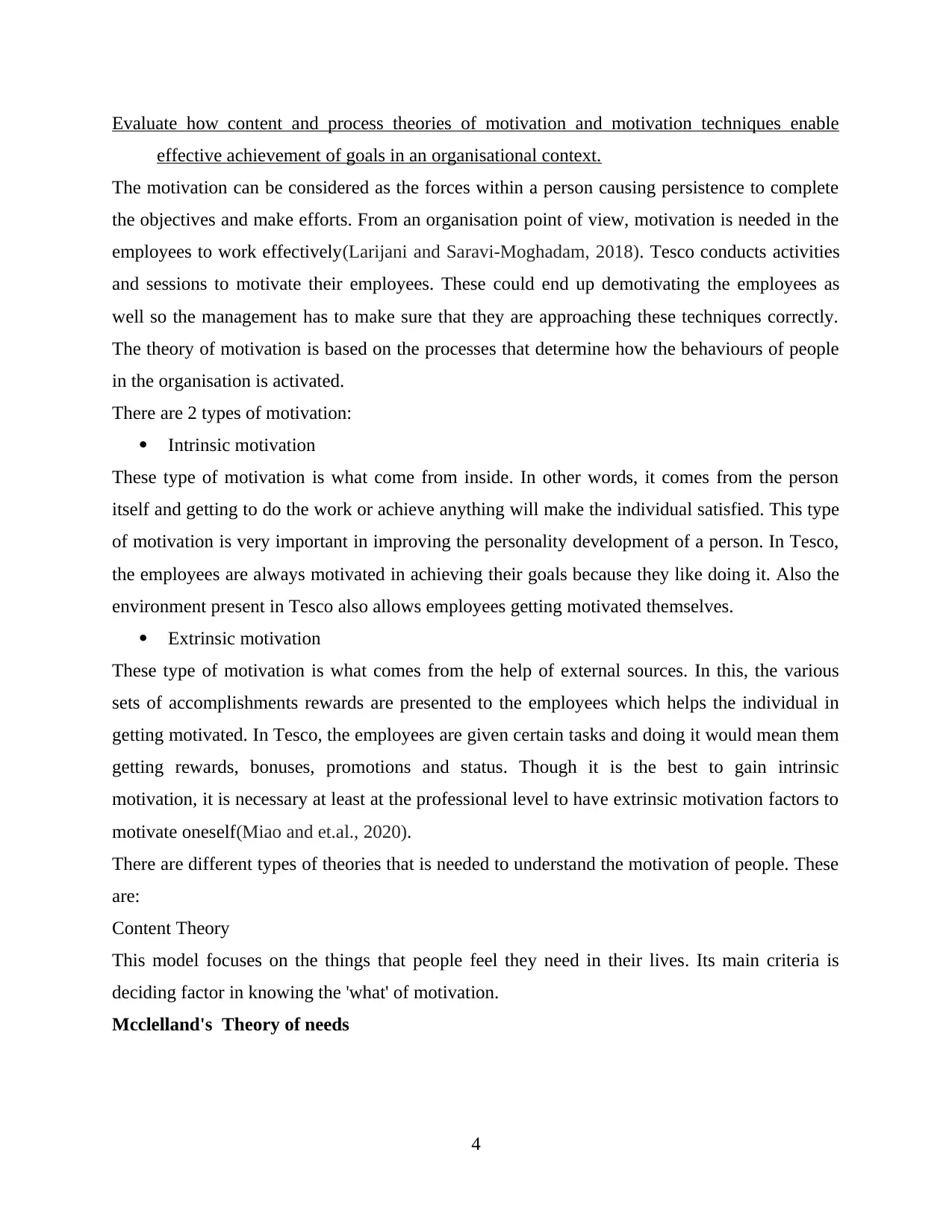
Evaluate how content and process theories of motivation and motivation techniques enable
effective achievement of goals in an organisational context.
The motivation can be considered as the forces within a person causing persistence to complete
the objectives and make efforts. From an organisation point of view, motivation is needed in the
employees to work effectively(Larijani and Saravi-Moghadam, 2018). Tesco conducts activities
and sessions to motivate their employees. These could end up demotivating the employees as
well so the management has to make sure that they are approaching these techniques correctly.
The theory of motivation is based on the processes that determine how the behaviours of people
in the organisation is activated.
There are 2 types of motivation:
Intrinsic motivation
These type of motivation is what come from inside. In other words, it comes from the person
itself and getting to do the work or achieve anything will make the individual satisfied. This type
of motivation is very important in improving the personality development of a person. In Tesco,
the employees are always motivated in achieving their goals because they like doing it. Also the
environment present in Tesco also allows employees getting motivated themselves.
Extrinsic motivation
These type of motivation is what comes from the help of external sources. In this, the various
sets of accomplishments rewards are presented to the employees which helps the individual in
getting motivated. In Tesco, the employees are given certain tasks and doing it would mean them
getting rewards, bonuses, promotions and status. Though it is the best to gain intrinsic
motivation, it is necessary at least at the professional level to have extrinsic motivation factors to
motivate oneself(Miao and et.al., 2020).
There are different types of theories that is needed to understand the motivation of people. These
are:
Content Theory
This model focuses on the things that people feel they need in their lives. Its main criteria is
deciding factor in knowing the 'what' of motivation.
Mcclelland's Theory of needs
4
effective achievement of goals in an organisational context.
The motivation can be considered as the forces within a person causing persistence to complete
the objectives and make efforts. From an organisation point of view, motivation is needed in the
employees to work effectively(Larijani and Saravi-Moghadam, 2018). Tesco conducts activities
and sessions to motivate their employees. These could end up demotivating the employees as
well so the management has to make sure that they are approaching these techniques correctly.
The theory of motivation is based on the processes that determine how the behaviours of people
in the organisation is activated.
There are 2 types of motivation:
Intrinsic motivation
These type of motivation is what come from inside. In other words, it comes from the person
itself and getting to do the work or achieve anything will make the individual satisfied. This type
of motivation is very important in improving the personality development of a person. In Tesco,
the employees are always motivated in achieving their goals because they like doing it. Also the
environment present in Tesco also allows employees getting motivated themselves.
Extrinsic motivation
These type of motivation is what comes from the help of external sources. In this, the various
sets of accomplishments rewards are presented to the employees which helps the individual in
getting motivated. In Tesco, the employees are given certain tasks and doing it would mean them
getting rewards, bonuses, promotions and status. Though it is the best to gain intrinsic
motivation, it is necessary at least at the professional level to have extrinsic motivation factors to
motivate oneself(Miao and et.al., 2020).
There are different types of theories that is needed to understand the motivation of people. These
are:
Content Theory
This model focuses on the things that people feel they need in their lives. Its main criteria is
deciding factor in knowing the 'what' of motivation.
Mcclelland's Theory of needs
4
⊘ This is a preview!⊘
Do you want full access?
Subscribe today to unlock all pages.

Trusted by 1+ million students worldwide
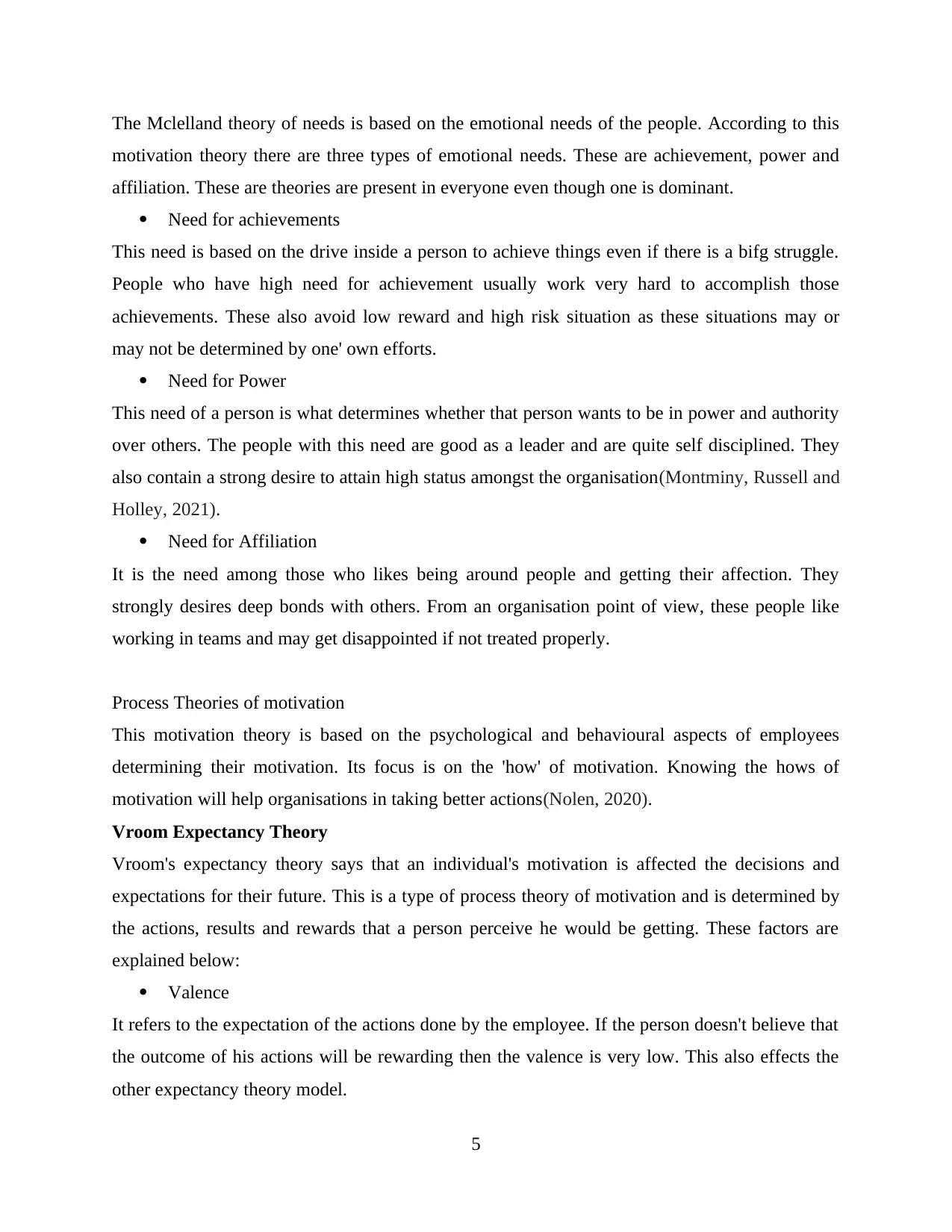
The Mclelland theory of needs is based on the emotional needs of the people. According to this
motivation theory there are three types of emotional needs. These are achievement, power and
affiliation. These are theories are present in everyone even though one is dominant.
Need for achievements
This need is based on the drive inside a person to achieve things even if there is a bifg struggle.
People who have high need for achievement usually work very hard to accomplish those
achievements. These also avoid low reward and high risk situation as these situations may or
may not be determined by one' own efforts.
Need for Power
This need of a person is what determines whether that person wants to be in power and authority
over others. The people with this need are good as a leader and are quite self disciplined. They
also contain a strong desire to attain high status amongst the organisation(Montminy, Russell and
Holley, 2021).
Need for Affiliation
It is the need among those who likes being around people and getting their affection. They
strongly desires deep bonds with others. From an organisation point of view, these people like
working in teams and may get disappointed if not treated properly.
Process Theories of motivation
This motivation theory is based on the psychological and behavioural aspects of employees
determining their motivation. Its focus is on the 'how' of motivation. Knowing the hows of
motivation will help organisations in taking better actions(Nolen, 2020).
Vroom Expectancy Theory
Vroom's expectancy theory says that an individual's motivation is affected the decisions and
expectations for their future. This is a type of process theory of motivation and is determined by
the actions, results and rewards that a person perceive he would be getting. These factors are
explained below:
Valence
It refers to the expectation of the actions done by the employee. If the person doesn't believe that
the outcome of his actions will be rewarding then the valence is very low. This also effects the
other expectancy theory model.
5
motivation theory there are three types of emotional needs. These are achievement, power and
affiliation. These are theories are present in everyone even though one is dominant.
Need for achievements
This need is based on the drive inside a person to achieve things even if there is a bifg struggle.
People who have high need for achievement usually work very hard to accomplish those
achievements. These also avoid low reward and high risk situation as these situations may or
may not be determined by one' own efforts.
Need for Power
This need of a person is what determines whether that person wants to be in power and authority
over others. The people with this need are good as a leader and are quite self disciplined. They
also contain a strong desire to attain high status amongst the organisation(Montminy, Russell and
Holley, 2021).
Need for Affiliation
It is the need among those who likes being around people and getting their affection. They
strongly desires deep bonds with others. From an organisation point of view, these people like
working in teams and may get disappointed if not treated properly.
Process Theories of motivation
This motivation theory is based on the psychological and behavioural aspects of employees
determining their motivation. Its focus is on the 'how' of motivation. Knowing the hows of
motivation will help organisations in taking better actions(Nolen, 2020).
Vroom Expectancy Theory
Vroom's expectancy theory says that an individual's motivation is affected the decisions and
expectations for their future. This is a type of process theory of motivation and is determined by
the actions, results and rewards that a person perceive he would be getting. These factors are
explained below:
Valence
It refers to the expectation of the actions done by the employee. If the person doesn't believe that
the outcome of his actions will be rewarding then the valence is very low. This also effects the
other expectancy theory model.
5
Paraphrase This Document
Need a fresh take? Get an instant paraphrase of this document with our AI Paraphraser
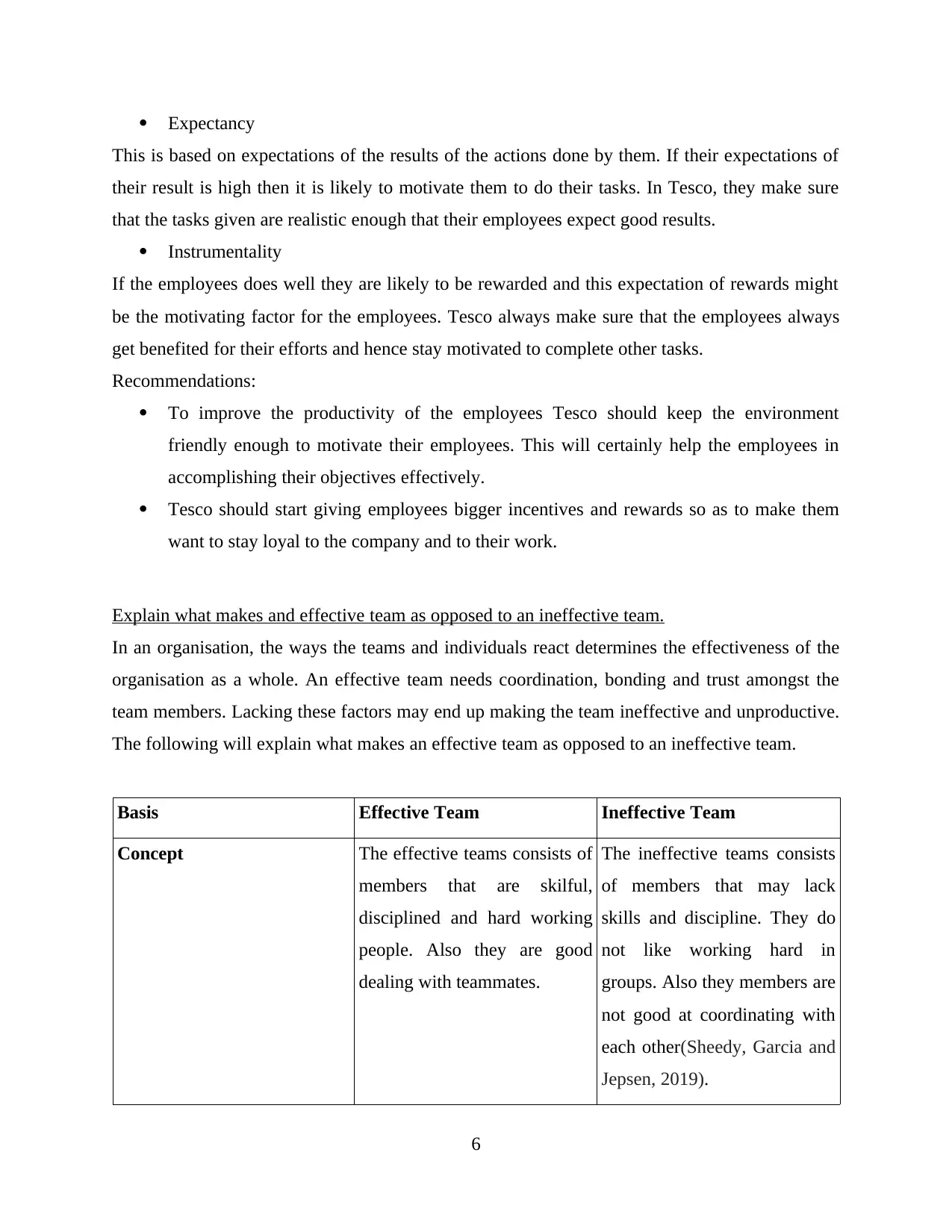
Expectancy
This is based on expectations of the results of the actions done by them. If their expectations of
their result is high then it is likely to motivate them to do their tasks. In Tesco, they make sure
that the tasks given are realistic enough that their employees expect good results.
Instrumentality
If the employees does well they are likely to be rewarded and this expectation of rewards might
be the motivating factor for the employees. Tesco always make sure that the employees always
get benefited for their efforts and hence stay motivated to complete other tasks.
Recommendations:
To improve the productivity of the employees Tesco should keep the environment
friendly enough to motivate their employees. This will certainly help the employees in
accomplishing their objectives effectively.
Tesco should start giving employees bigger incentives and rewards so as to make them
want to stay loyal to the company and to their work.
Explain what makes and effective team as opposed to an ineffective team.
In an organisation, the ways the teams and individuals react determines the effectiveness of the
organisation as a whole. An effective team needs coordination, bonding and trust amongst the
team members. Lacking these factors may end up making the team ineffective and unproductive.
The following will explain what makes an effective team as opposed to an ineffective team.
Basis Effective Team Ineffective Team
Concept The effective teams consists of
members that are skilful,
disciplined and hard working
people. Also they are good
dealing with teammates.
The ineffective teams consists
of members that may lack
skills and discipline. They do
not like working hard in
groups. Also they members are
not good at coordinating with
each other(Sheedy, Garcia and
Jepsen, 2019).
6
This is based on expectations of the results of the actions done by them. If their expectations of
their result is high then it is likely to motivate them to do their tasks. In Tesco, they make sure
that the tasks given are realistic enough that their employees expect good results.
Instrumentality
If the employees does well they are likely to be rewarded and this expectation of rewards might
be the motivating factor for the employees. Tesco always make sure that the employees always
get benefited for their efforts and hence stay motivated to complete other tasks.
Recommendations:
To improve the productivity of the employees Tesco should keep the environment
friendly enough to motivate their employees. This will certainly help the employees in
accomplishing their objectives effectively.
Tesco should start giving employees bigger incentives and rewards so as to make them
want to stay loyal to the company and to their work.
Explain what makes and effective team as opposed to an ineffective team.
In an organisation, the ways the teams and individuals react determines the effectiveness of the
organisation as a whole. An effective team needs coordination, bonding and trust amongst the
team members. Lacking these factors may end up making the team ineffective and unproductive.
The following will explain what makes an effective team as opposed to an ineffective team.
Basis Effective Team Ineffective Team
Concept The effective teams consists of
members that are skilful,
disciplined and hard working
people. Also they are good
dealing with teammates.
The ineffective teams consists
of members that may lack
skills and discipline. They do
not like working hard in
groups. Also they members are
not good at coordinating with
each other(Sheedy, Garcia and
Jepsen, 2019).
6
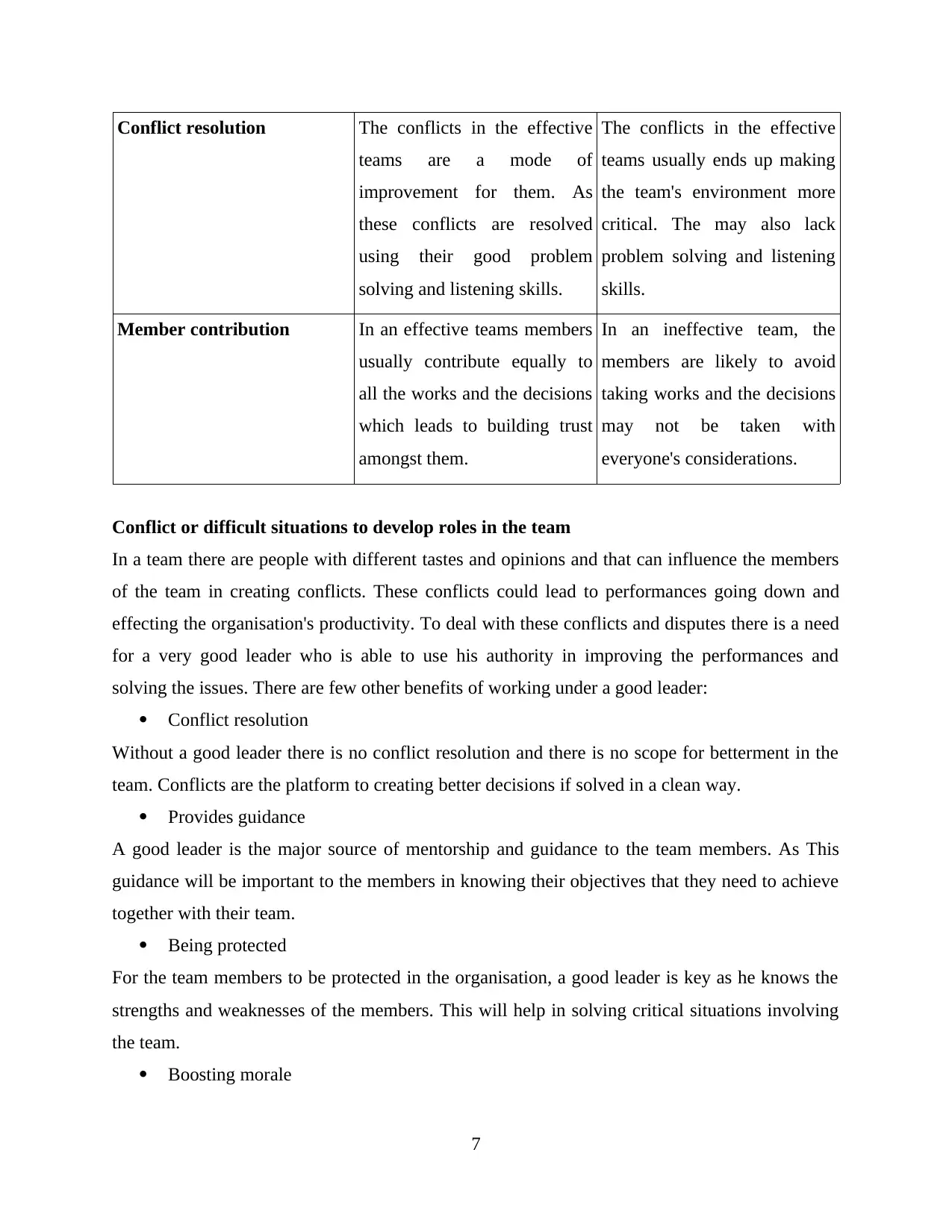
Conflict resolution The conflicts in the effective
teams are a mode of
improvement for them. As
these conflicts are resolved
using their good problem
solving and listening skills.
The conflicts in the effective
teams usually ends up making
the team's environment more
critical. The may also lack
problem solving and listening
skills.
Member contribution In an effective teams members
usually contribute equally to
all the works and the decisions
which leads to building trust
amongst them.
In an ineffective team, the
members are likely to avoid
taking works and the decisions
may not be taken with
everyone's considerations.
Conflict or difficult situations to develop roles in the team
In a team there are people with different tastes and opinions and that can influence the members
of the team in creating conflicts. These conflicts could lead to performances going down and
effecting the organisation's productivity. To deal with these conflicts and disputes there is a need
for a very good leader who is able to use his authority in improving the performances and
solving the issues. There are few other benefits of working under a good leader:
Conflict resolution
Without a good leader there is no conflict resolution and there is no scope for betterment in the
team. Conflicts are the platform to creating better decisions if solved in a clean way.
Provides guidance
A good leader is the major source of mentorship and guidance to the team members. As This
guidance will be important to the members in knowing their objectives that they need to achieve
together with their team.
Being protected
For the team members to be protected in the organisation, a good leader is key as he knows the
strengths and weaknesses of the members. This will help in solving critical situations involving
the team.
Boosting morale
7
teams are a mode of
improvement for them. As
these conflicts are resolved
using their good problem
solving and listening skills.
The conflicts in the effective
teams usually ends up making
the team's environment more
critical. The may also lack
problem solving and listening
skills.
Member contribution In an effective teams members
usually contribute equally to
all the works and the decisions
which leads to building trust
amongst them.
In an ineffective team, the
members are likely to avoid
taking works and the decisions
may not be taken with
everyone's considerations.
Conflict or difficult situations to develop roles in the team
In a team there are people with different tastes and opinions and that can influence the members
of the team in creating conflicts. These conflicts could lead to performances going down and
effecting the organisation's productivity. To deal with these conflicts and disputes there is a need
for a very good leader who is able to use his authority in improving the performances and
solving the issues. There are few other benefits of working under a good leader:
Conflict resolution
Without a good leader there is no conflict resolution and there is no scope for betterment in the
team. Conflicts are the platform to creating better decisions if solved in a clean way.
Provides guidance
A good leader is the major source of mentorship and guidance to the team members. As This
guidance will be important to the members in knowing their objectives that they need to achieve
together with their team.
Being protected
For the team members to be protected in the organisation, a good leader is key as he knows the
strengths and weaknesses of the members. This will help in solving critical situations involving
the team.
Boosting morale
7
⊘ This is a preview!⊘
Do you want full access?
Subscribe today to unlock all pages.

Trusted by 1+ million students worldwide
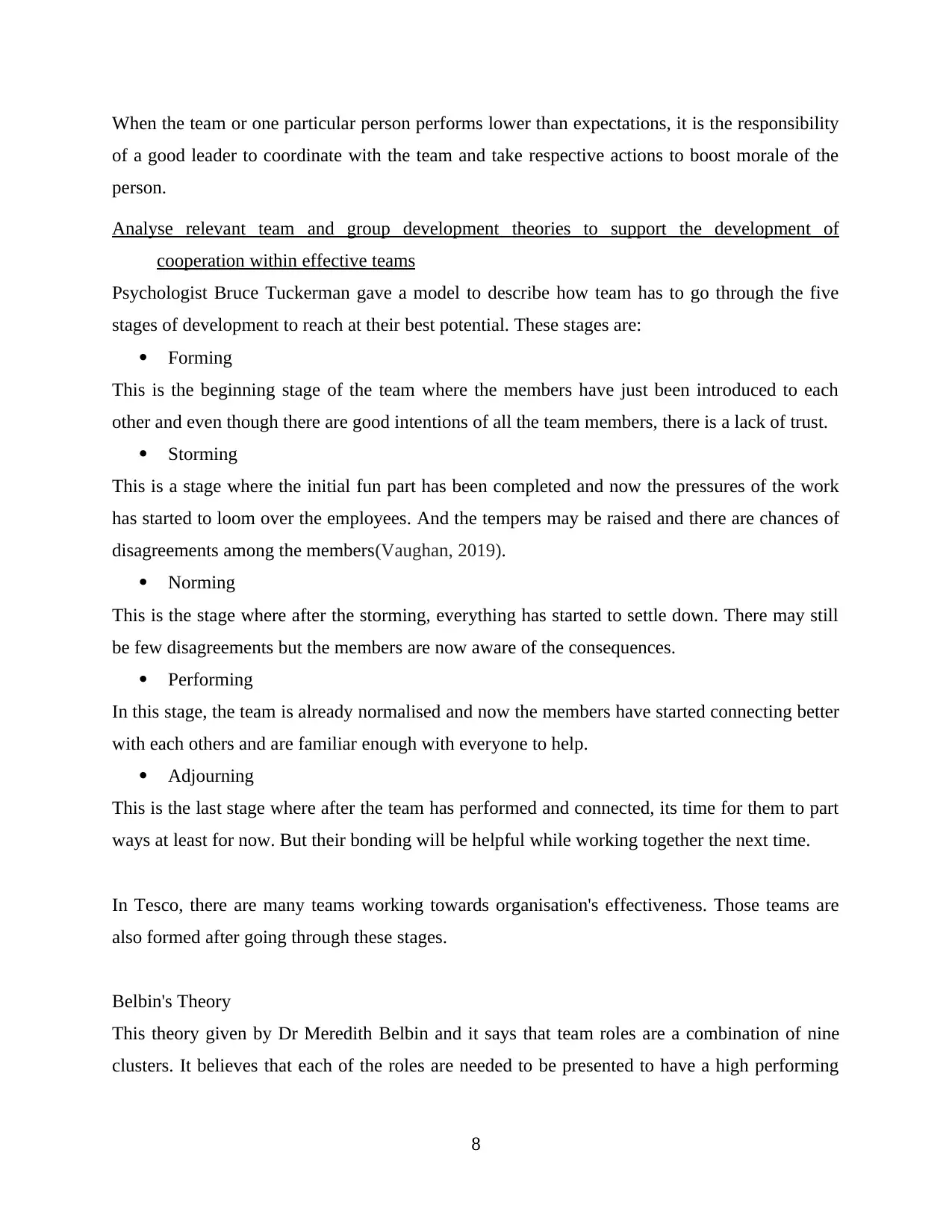
When the team or one particular person performs lower than expectations, it is the responsibility
of a good leader to coordinate with the team and take respective actions to boost morale of the
person.
Analyse relevant team and group development theories to support the development of
cooperation within effective teams
Psychologist Bruce Tuckerman gave a model to describe how team has to go through the five
stages of development to reach at their best potential. These stages are:
Forming
This is the beginning stage of the team where the members have just been introduced to each
other and even though there are good intentions of all the team members, there is a lack of trust.
Storming
This is a stage where the initial fun part has been completed and now the pressures of the work
has started to loom over the employees. And the tempers may be raised and there are chances of
disagreements among the members(Vaughan, 2019).
Norming
This is the stage where after the storming, everything has started to settle down. There may still
be few disagreements but the members are now aware of the consequences.
Performing
In this stage, the team is already normalised and now the members have started connecting better
with each others and are familiar enough with everyone to help.
Adjourning
This is the last stage where after the team has performed and connected, its time for them to part
ways at least for now. But their bonding will be helpful while working together the next time.
In Tesco, there are many teams working towards organisation's effectiveness. Those teams are
also formed after going through these stages.
Belbin's Theory
This theory given by Dr Meredith Belbin and it says that team roles are a combination of nine
clusters. It believes that each of the roles are needed to be presented to have a high performing
8
of a good leader to coordinate with the team and take respective actions to boost morale of the
person.
Analyse relevant team and group development theories to support the development of
cooperation within effective teams
Psychologist Bruce Tuckerman gave a model to describe how team has to go through the five
stages of development to reach at their best potential. These stages are:
Forming
This is the beginning stage of the team where the members have just been introduced to each
other and even though there are good intentions of all the team members, there is a lack of trust.
Storming
This is a stage where the initial fun part has been completed and now the pressures of the work
has started to loom over the employees. And the tempers may be raised and there are chances of
disagreements among the members(Vaughan, 2019).
Norming
This is the stage where after the storming, everything has started to settle down. There may still
be few disagreements but the members are now aware of the consequences.
Performing
In this stage, the team is already normalised and now the members have started connecting better
with each others and are familiar enough with everyone to help.
Adjourning
This is the last stage where after the team has performed and connected, its time for them to part
ways at least for now. But their bonding will be helpful while working together the next time.
In Tesco, there are many teams working towards organisation's effectiveness. Those teams are
also formed after going through these stages.
Belbin's Theory
This theory given by Dr Meredith Belbin and it says that team roles are a combination of nine
clusters. It believes that each of the roles are needed to be presented to have a high performing
8
Paraphrase This Document
Need a fresh take? Get an instant paraphrase of this document with our AI Paraphraser
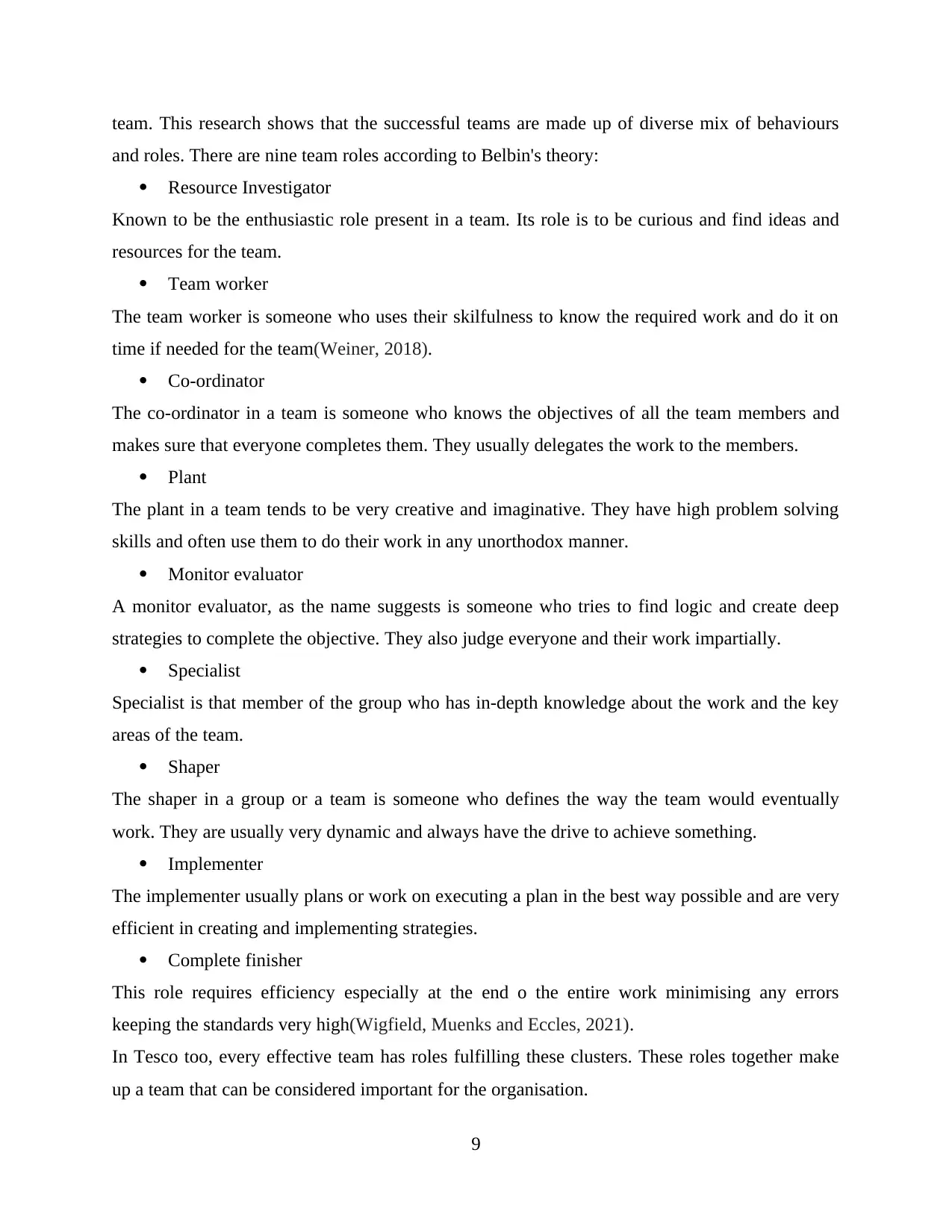
team. This research shows that the successful teams are made up of diverse mix of behaviours
and roles. There are nine team roles according to Belbin's theory:
Resource Investigator
Known to be the enthusiastic role present in a team. Its role is to be curious and find ideas and
resources for the team.
Team worker
The team worker is someone who uses their skilfulness to know the required work and do it on
time if needed for the team(Weiner, 2018).
Co-ordinator
The co-ordinator in a team is someone who knows the objectives of all the team members and
makes sure that everyone completes them. They usually delegates the work to the members.
Plant
The plant in a team tends to be very creative and imaginative. They have high problem solving
skills and often use them to do their work in any unorthodox manner.
Monitor evaluator
A monitor evaluator, as the name suggests is someone who tries to find logic and create deep
strategies to complete the objective. They also judge everyone and their work impartially.
Specialist
Specialist is that member of the group who has in-depth knowledge about the work and the key
areas of the team.
Shaper
The shaper in a group or a team is someone who defines the way the team would eventually
work. They are usually very dynamic and always have the drive to achieve something.
Implementer
The implementer usually plans or work on executing a plan in the best way possible and are very
efficient in creating and implementing strategies.
Complete finisher
This role requires efficiency especially at the end o the entire work minimising any errors
keeping the standards very high(Wigfield, Muenks and Eccles, 2021).
In Tesco too, every effective team has roles fulfilling these clusters. These roles together make
up a team that can be considered important for the organisation.
9
and roles. There are nine team roles according to Belbin's theory:
Resource Investigator
Known to be the enthusiastic role present in a team. Its role is to be curious and find ideas and
resources for the team.
Team worker
The team worker is someone who uses their skilfulness to know the required work and do it on
time if needed for the team(Weiner, 2018).
Co-ordinator
The co-ordinator in a team is someone who knows the objectives of all the team members and
makes sure that everyone completes them. They usually delegates the work to the members.
Plant
The plant in a team tends to be very creative and imaginative. They have high problem solving
skills and often use them to do their work in any unorthodox manner.
Monitor evaluator
A monitor evaluator, as the name suggests is someone who tries to find logic and create deep
strategies to complete the objective. They also judge everyone and their work impartially.
Specialist
Specialist is that member of the group who has in-depth knowledge about the work and the key
areas of the team.
Shaper
The shaper in a group or a team is someone who defines the way the team would eventually
work. They are usually very dynamic and always have the drive to achieve something.
Implementer
The implementer usually plans or work on executing a plan in the best way possible and are very
efficient in creating and implementing strategies.
Complete finisher
This role requires efficiency especially at the end o the entire work minimising any errors
keeping the standards very high(Wigfield, Muenks and Eccles, 2021).
In Tesco too, every effective team has roles fulfilling these clusters. These roles together make
up a team that can be considered important for the organisation.
9
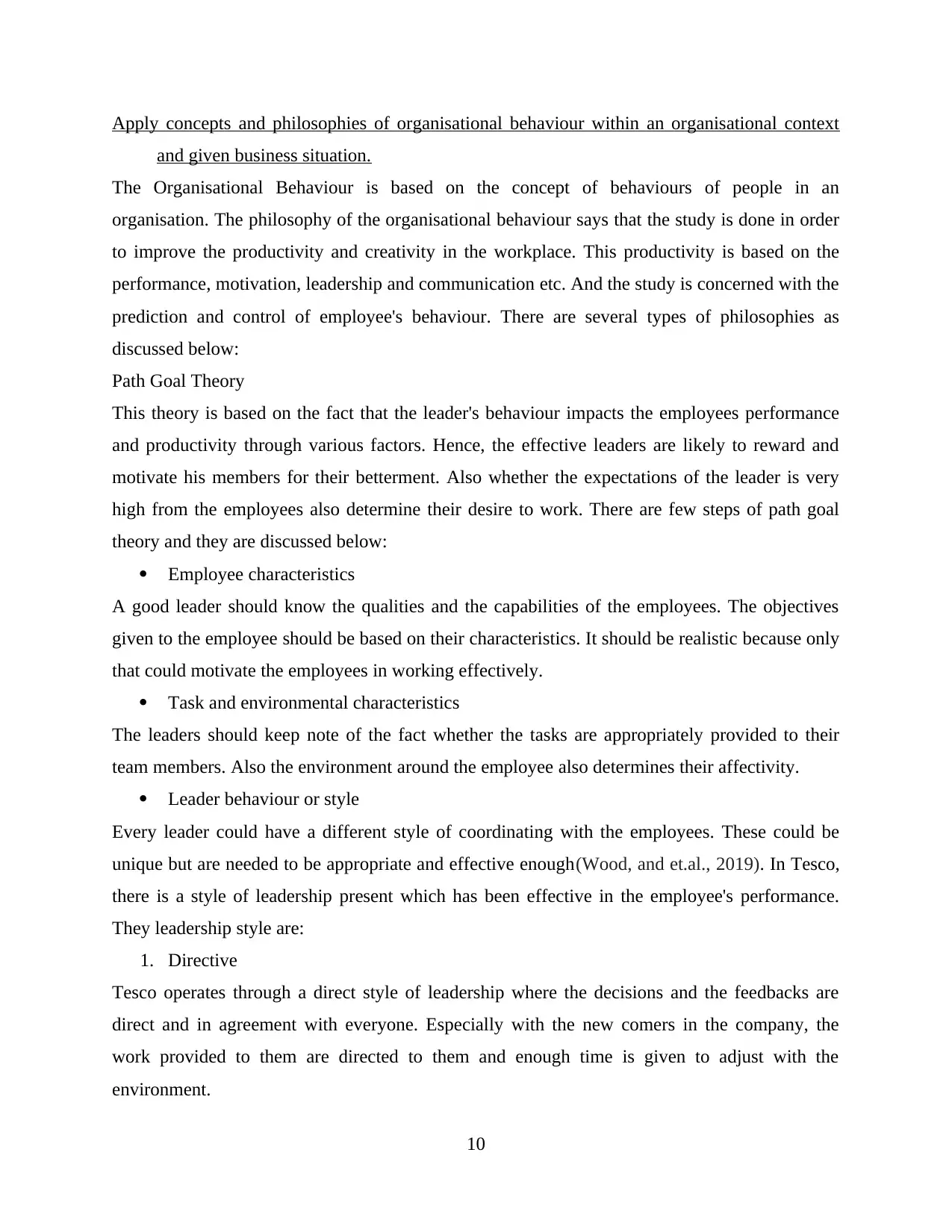
Apply concepts and philosophies of organisational behaviour within an organisational context
and given business situation.
The Organisational Behaviour is based on the concept of behaviours of people in an
organisation. The philosophy of the organisational behaviour says that the study is done in order
to improve the productivity and creativity in the workplace. This productivity is based on the
performance, motivation, leadership and communication etc. And the study is concerned with the
prediction and control of employee's behaviour. There are several types of philosophies as
discussed below:
Path Goal Theory
This theory is based on the fact that the leader's behaviour impacts the employees performance
and productivity through various factors. Hence, the effective leaders are likely to reward and
motivate his members for their betterment. Also whether the expectations of the leader is very
high from the employees also determine their desire to work. There are few steps of path goal
theory and they are discussed below:
Employee characteristics
A good leader should know the qualities and the capabilities of the employees. The objectives
given to the employee should be based on their characteristics. It should be realistic because only
that could motivate the employees in working effectively.
Task and environmental characteristics
The leaders should keep note of the fact whether the tasks are appropriately provided to their
team members. Also the environment around the employee also determines their affectivity.
Leader behaviour or style
Every leader could have a different style of coordinating with the employees. These could be
unique but are needed to be appropriate and effective enough(Wood, and et.al., 2019). In Tesco,
there is a style of leadership present which has been effective in the employee's performance.
They leadership style are:
1. Directive
Tesco operates through a direct style of leadership where the decisions and the feedbacks are
direct and in agreement with everyone. Especially with the new comers in the company, the
work provided to them are directed to them and enough time is given to adjust with the
environment.
10
and given business situation.
The Organisational Behaviour is based on the concept of behaviours of people in an
organisation. The philosophy of the organisational behaviour says that the study is done in order
to improve the productivity and creativity in the workplace. This productivity is based on the
performance, motivation, leadership and communication etc. And the study is concerned with the
prediction and control of employee's behaviour. There are several types of philosophies as
discussed below:
Path Goal Theory
This theory is based on the fact that the leader's behaviour impacts the employees performance
and productivity through various factors. Hence, the effective leaders are likely to reward and
motivate his members for their betterment. Also whether the expectations of the leader is very
high from the employees also determine their desire to work. There are few steps of path goal
theory and they are discussed below:
Employee characteristics
A good leader should know the qualities and the capabilities of the employees. The objectives
given to the employee should be based on their characteristics. It should be realistic because only
that could motivate the employees in working effectively.
Task and environmental characteristics
The leaders should keep note of the fact whether the tasks are appropriately provided to their
team members. Also the environment around the employee also determines their affectivity.
Leader behaviour or style
Every leader could have a different style of coordinating with the employees. These could be
unique but are needed to be appropriate and effective enough(Wood, and et.al., 2019). In Tesco,
there is a style of leadership present which has been effective in the employee's performance.
They leadership style are:
1. Directive
Tesco operates through a direct style of leadership where the decisions and the feedbacks are
direct and in agreement with everyone. Especially with the new comers in the company, the
work provided to them are directed to them and enough time is given to adjust with the
environment.
10
⊘ This is a preview!⊘
Do you want full access?
Subscribe today to unlock all pages.

Trusted by 1+ million students worldwide
1 out of 14
Related Documents
Your All-in-One AI-Powered Toolkit for Academic Success.
+13062052269
info@desklib.com
Available 24*7 on WhatsApp / Email
![[object Object]](/_next/static/media/star-bottom.7253800d.svg)
Unlock your academic potential
Copyright © 2020–2026 A2Z Services. All Rights Reserved. Developed and managed by ZUCOL.



